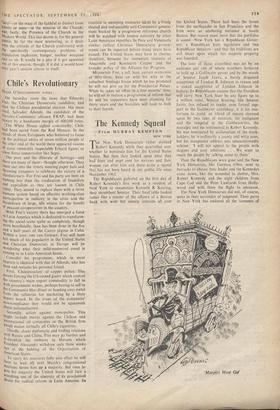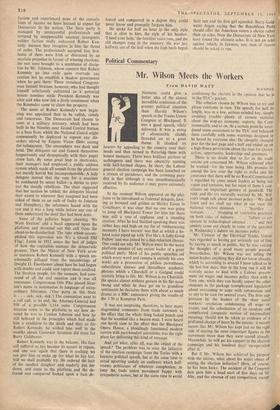The Kennedy Squeal
From MURRAY KEMPTON
IsfEW YORK
THE New York Democrats rather disliked Robert Kennedy while they quarrelled over whether to nominate him for the United States Senate. But then they looked upon what they had done and wept over his sorrows and their women ran after him and there arose a squeal that has not been heard in our public life since November 1963.
The Republicans gathered on the first day of Robert Kennedy's first week as a resident of New York to renominate Kenneth B. Keating, their incumbent Senator. Their head table looked rather like a muster of the officers of a Boston• bank with wide but uneasy interests all over the United 'States. There had been the losses from the earthquake in San Francisco and the Irish were an unabating nuisance in South Boston. But reason must insist that the portfolio is sound—New Ybrk has a Republican Gover- nor, a Republican State legislature and two Republican Senators—and that the traditions are still intact upon which this majestic property was founded.
The tone of those assembled was set by an audience just one of whose members bothered to hold up a Goldwater poster and by the words of Senator Jacob Javits, a barely disguised acceptance of Lyndon B. Johnson in reason and a naked acceptance of Lyndon Johnson in history. Its Republicans assume that the President will carry New York State by any figure up to a million votes. Senator Keating, like Senator Javits, has refused to render even formal sup- port to the Goldwater candidacy; it is his mis- fortune to stand, an island of reason stormed upon by two tides of emotion, the malignant and the vengeful in the Goldwaterites, the nostalgic and the sentimental in Robert Kennedy. He was nominated by acclamation of the stock- holders; he is ordinarily a jaunty and witty man, but his •acceptance address was unaccustomedly solemn : 'I will not appeal to the people with slogans and easy solutions. . . . We want to reach the people by talking sense to them.'
Then the Republicans were gone and the New York Democrats, like German tribes, went to barracks to choose their leader and the Kennedys came down, like the wounded to shelter, Mrs. Robert Kennedy and the eight children from Cape Cod and the Peter Lawfords from Holly- wood and with them the flight to unreason.
The New York Democrats did not, of course, unite in their surrender of judgment. Their party in New York has endured all the torments of faction and experienced none of the consola- tions of success we have learned to expect for Democrats in the nation. The State party is managed by unsuccessful professionals and tortured by unappeasable amateur insurgents; neither faction really welcomed Robert Ken- nedy, because they recognise in him the threat of order. The professionals accepted him first. Some of them were Irish or distracted by an atavistic prejudice in favour of winning elections; the rest were brought to a semblance of discip- line by Mr. Johnson, whose concern that Robert Kennedy go into exile quite overrode any caution lest he establish a shadow government when he gets there. There remained Congress- man Samuel Stratton, however, who had thought himself solicitously cultivated as a potential Senate nominee while President Kennedy was alive and who now felt a lively resentment when the Kennedys came to claim the property.
The scene of Robert Kennedy's new begin- ning was appointed then to be raffish, rowdy and rancorous. The Democrats had chosen to meet at a military armoury, which had been built in the Nineties near Grand Central Station as a base from which the National Guard might conveniently be deployed to repress any dis- orders stirred by Eugene Victor Debs among the railwaymen. The atmosphere was dank and fetid. The delegates sat and fanned themselves languorously and dyspeptically with their paper straw hats. By some great leap in electronics, their managers had employed a public address system which made all sounds from the platform not merely horrid but incomprehensible. A lady delegate moved that the vote fok a nominee be conducted by secret ballot—a device to pro- tect the timidly rebellious. The chair suggested that her motion be tabled; the delegates bleated their assent to whatever they imagined had been asked of them as an oath of fealty to Johnson and Humphrey; the reformers baaed with the rest and it was a long while before any one of them understood the deed that had been done.
Some of the galleries began chanting 'We Want Stratton' and a band appeared upon the platform and drowned out this call from the about-to-be-disinherited. The tune which accom- plished this repression was 'It's a Grand Old Flag'; Lenin in 1912 seems the best of judges of how the 'capitalists manage the democratic process. Then the Mayor of New York arose to nominate Robert Kennedy with a speech un- ashamedly pillaged from the meanderings of Dwight D. Eisenhower about how he had begun with doubts and could now report them resolved. The Stratton people, for the moment, had com- mand of all the real emotion and it was all venomous. Congressman Otis Pike placed Strat- ton's name in nomination in language of extra- ordinary bitterness. ('Our party in this State is . . . sick, sick, sick.') The convention went to a roll call; at its end, the Attorney-General had 958 of a possible 1,114 votes. Congressman Stratton came to the platform to say how de- voted he was to Lyndon Johnson and how he still believed in the principles which had made him a candidate to the death and that, as for Robert Kennedy, he wished him well in the months ahead. Governor Scranton did more for Barry Goldwater.
Robert Kennedy was in the balcony. His face still suffered as has become its nature in repose, and one saw again that there is nothing we can give him to make up for what he has lost. Still we shall probably try. He ordered the hair of his smallest daughter and tenderly put her down, and came to the platform and the de- feated and conquered looked upon a face de- e- THE THE feated and conquered to a degree they could never know and promptly forgave him.
He spoke for half an hour in the only style that is alive to him, the style of his brother. 'I need your help,' the familiar voice rose, and the old changes rang in the memory. He was just halfway out of the hall when the high heels began their run and the first girl squealed. Barry Gold- water began saying that the Republican Party should offer the American voters a choice rather than an echo. Now the Democrats of New York have found the ultimate echo. It is not an echo against which, in fairness, any man of reason , should be asked to run.































 Previous page
Previous page